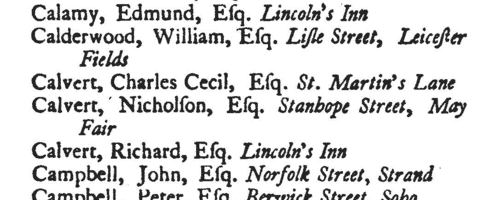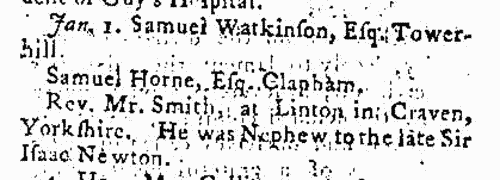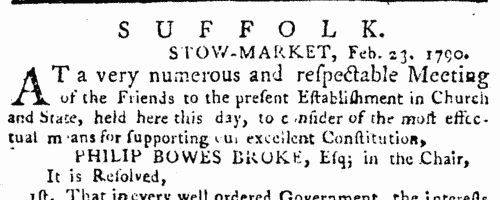Add this eBook to your basket to receive access to all 227 records. Our indexes include entries for the spelling ayton. In the period you have requested, we have the following 227 records (displaying 41 to 50): These sample scans are from the original record. You will get scans of the full pages or articles where the surname you searched for has been found. Your web browser may prevent the sample windows from opening; in this case please change your browser settings to allow pop-up windows from this site. Members of the Society for the Encouragement of Arts &c.
(1766)
A List of the Society for the Encouragement of Arts, Manufactures, and Commerce, 18 August 1766. | Sample scan, click to enlarge

|  Masters of apprentices registered in Norwich
(1767) Masters of apprentices registered in Norwich
(1767)
Apprenticeship indentures and clerks' articles were subject to a 6d or 12d per pound stamp duty: the registers of the payments usually give the master's trade, address, and occupation, and the apprentice's name, as well as details of the date and length of the apprenticeship. There are central registers for collections of the stamp duty in London, as well as returns from collectors in the provinces. These collectors generally received duty just from their own county, but sometimes from further afield. The indentures themselves can date from a year or two earlier than this return. (The sample entry shown on this scan is taken from a Salop return. Each entry has two scans, the other being the facing page with the details of the indenture, length of service, and payment of duty.) IR 1/56 | Sample scan, click to enlarge

|  Masters of Apprentices
(1770) Masters of Apprentices
(1770)
Apprenticeship indentures and clerks' articles were subject to a 6d or 12d per pound stamp duty (late payment of the 6d rate attracted double duty (D D) of 12d): the registers of the payments usually give the master's trade, address, and occupation, and the apprentice's name, as well as details of the date and length of the apprenticeship. 2 January to 31 December 1770. | Sample scan, click to enlarge

|  Apprentices registered in Norfolk
(1774) Apprentices registered in Norfolk
(1774)
Apprenticeship indentures and clerks' articles were subject to a 6d or 12d per pound stamp duty: the registers of the payments usually give the master's trade, address, and occupation, and the apprentice's name, as well as details of the date and length of the apprenticeship. There are central registers for collections of the stamp duty in London, as well as returns from collectors in the provinces. These collectors generally received duty just from their own county, but sometimes from further afield. The indentures themselves can date from a year or two earlier than this return. (The sample entry shown on this scan is taken from a Bristol return. Each entry has two scans, the other being the facing page with the details of the indenture, length of service, and payment of duty.) IR 1/59 | Sample scan, click to enlarge

|  Apprentices
(1776) Apprentices
(1776)
Apprenticeship indentures and clerks' articles were subject to a 6d or 12d per pound stamp duty: the registers of the payments usually give the master's trade, address, and occupation, and the apprentice's name, as well as details of the date and length of the apprenticeship. 6 May to 31 December 1776. IR 1/29 | Sample scan, click to enlarge

| Deaths, Marriages, News and Promotions
(1777)
Death notices and obituaries, marriage and birth notices, civil and military promotions, clerical preferments, and bankrupts, as reported in the Gentleman's Magazine. Mostly from England and Wales, but items from Ireland, Scotland and abroad.
| Sample scan, click to enlarge

|  Masters of Apprentices registered in Norfolk
(1777) Masters of Apprentices registered in Norfolk
(1777)
Apprenticeship indentures and clerks' articles were subject to a 6d or 12d per pound stamp duty: the registers of the payments usually give the master's trade, address, and occupation, and the apprentice's name, as well as details of the date and length of the apprenticeship. There are central registers for collections of the stamp duty in London, as well as returns from collectors in the provinces. These collectors generally received duty just from their own county, but sometimes from further afield. The indentures themselves can date from a year or two earlier than this return. (The sample entry shown on this scan is taken from a Bristol return. Each entry has two scans, the other being the facing page with the details of the indenture, length of service, and payment of duty.) IR 1/60 | Sample scan, click to enlarge

|  Apprentices registered in Norfolk
(1778) Apprentices registered in Norfolk
(1778)
Apprenticeship indentures and clerks' articles were subject to a 6d or 12d per pound stamp duty: the registers of the payments usually give the master's trade, address, and occupation, and the apprentice's name, as well as details of the date and length of the apprenticeship. There are central registers for collections of the stamp duty in London, as well as returns from collectors in the provinces. These collectors generally received duty just from their own county, but sometimes from further afield. The indentures themselves can date from a year or two earlier than this return. (The sample entry shown on this scan is taken from a Bristol return. Each entry has two scans, the other being the facing page with the details of the indenture, length of service, and payment of duty.) IR 1/60 | Sample scan, click to enlarge

| Masters of Merchantmen
(1785)
The Daily Universal Register of January 1785 includes a section entitled Ship News. This is compiled from reports from Portsmouth, Deal, Poole and Gravesend as to merchant shipping movements; news of losses and sightings coming in from various ports; a list of Ships Arrived in the (London) River, in the Clyde, in the Downs, in the Humber, in Bantry Bay, off Beachy Head, off Beer Haven, off Cape Clear, off Cape Fear, off Hastings, off Hilston, off Portland, off Porto Bar, off Scilly, at Alicante, Ancona, Antigua, Baltimore, Barbadoes, Belfast, Bilbao, Bonny, Bordeaux, Boulogne, Bremen, Brighthelmstone (Brighton), Bristol, Cadiz, Cape Breton, Cartagena, Charlestown, Chester, Constantinople, Cork, Corunna, Cowes, Creek, Crookhaven, Dantzig, Dartmouth, Dominica, Dover, Dublin, Exeter, Falmouth, Faro, Figuera, Genoa, Gibraltar, Gottenburg, Greenock, Grenada, Halifax (Nova Scotia), Havannah, Hoylake, Hull, Jersey, Killybegs, Lancaster, Leghorn, Leith, Limerick, Lisbon, Liverpool, Londonderry, L'Orient, Lowestoft, Madeira, Madras, Milford, Minorca, Mogador, Naples, New Calabar, New Providence (Bahamas), New York, Newry, Nice, Old Calabar, Oporto, Ostend, Peel, Penzance, Philadelphia, Piscatequa, Plymouth, Pondicherry, Port Roseway, Porto, Portsmouth, Rochelle, Ross, Rotterdam, St Kitts, St Lucia, St Michael, St Vincents, Savannah, Scarborough, Southampton, Tenerife, Texel, Tobago, Torbay, Vigo, Waterford, Whitehaven, and in 'Africa', Angola, Grenadoes, Honduras, the Isle of Wight, Jamaica, Maryland, New England, Newfoundland, Philadelphia and Virginia; and Reports of Ships made at the Custom House in London. Except in the home ports, the register refers only to British shipping: each ship is usually identified merely by its name, and the master's surname, although masters' christian names are given occasionally. Naval vessels are mentioned rarely, and their captains' names not usually stated. | Sample scan, click to enlarge

| Friends of the Establishment in Suffolk
(1790)
On 23 February 1790 at Stowmarket 'a very numerous and respectable Meeting of the Friends to the present Establishment in Church and State' was held 'to consider of the most effectual means for supporting our excellent Constitution'. Seven resolutions were passed, a key one being 'That confining public employments and places of trust to persons professing the Established Religion, is expedient for the public good; as justice and reason naturally point out a preference to those subjects whose attachment to the constitution is perfect and unequivocal, rather than to those who comply in part only with the laws of this country'. Well over 200 subscribed, their names and the resolutions being subsequently published in several London and provincial newspapers. In some cases full names are given, in others just surnames with initials. | Sample scan, click to enlarge

|
Research your ancestry, family history, genealogy and one-name study by direct access to original records and archives indexed by surname.
|












